Fresh Energy’s J. Drake Hamilton attended the COP24 summit—which brings together an estimated 30,000 people from 197 nations. Read the full compilation of her updates from the summit.
December 21 | What was included in the Paris rulebook?
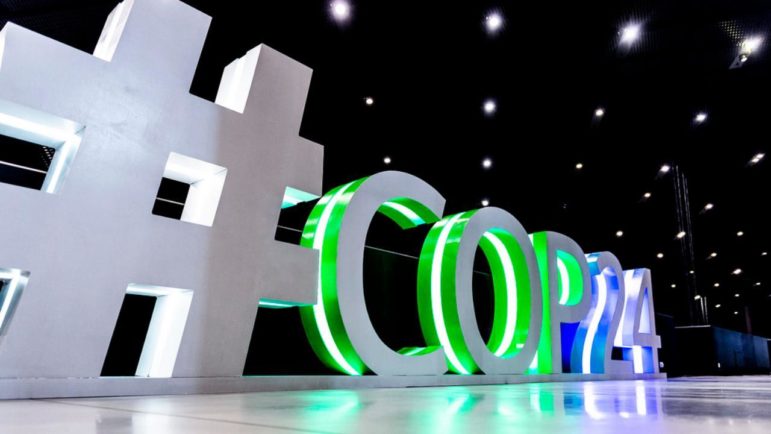
After two weeks of tumultuous negotiations, nations got the job done in Poland: they delivered. Nearly 14,000 delegates from 197 countries wrote the rules for how the 2015 Paris Agreement will work. Nations found common ground and delivered the Paris rulebook on how countries will communicate and renew their emissions and finance pledges, and how they will participate in an every five years collective review of the results, starting in 2023.
What’s in the Paris Rulebook? Here’s a summary on three key issues.
- Universal standards for accounting and reporting
One of the most important Paris rulebook priorities under both Presidents Obama and Trump has been the adoption of a transparent, common set of rules and procedures for accounting for climate commitments and for reporting their progress. The ability to accurately assess other countries’ progress is key to building global trust and encouraging countries to strengthen their climate actions. That’s why a State Department negotiator spent the first two years of the Trump presidency working with his Chinese counterpart to deliver a single set of transparency rules that now apply universally across all nations.
A separate section of the Paris rulebook mandates that parties use IPCC guidelines to provide emissions inventories every other year, and specifies what sectors and gases they must report.
The Paris rulebook also requires technical and peer review of countries’ commitments. Parties must admit international technical experts into their countries at least every five years to assess whether they are meeting their targets. All nations have to submit to questioning by other experts and participating countries.
- Financing climate actions in developing countries
Climate finance is key to many poor nations meeting their Paris commitments. The Paris rulebook requires developed nations to report climate finance information biennially, and to include their public commitments to that end. Although developing countries viewed that part of the rulebook as a step forward, they were also angered that the text includes language that would allow countries to count loans and other non-grant-based commitments toward their overall climate finance.
- Taking stock of progress to spur greater action
The hundreds of scientists who co-authored the IPCC report warned that the world must not exceed global warming of more than 1.5 degrees Celsius (2.7 degrees F), which is the aspirational goal of the Paris Agreement. Beginning in 2023, and then every five years, the world must take stock of its progress toward its temperature goals. The rulebook written at the 2018 climate talks describes this process as “crucial for enhancing the collective ambition of action and support towards achieving the purpose and long-term goals of the Paris Agreement.” We agree; taking stock worldwide forces a collective reckoning among nations about where we are on climate change and where we need to be to prevent the worse damages.
December 19 | Post event reflections from J. Drake Hamilton and Patrick Hamilton
Listen to Fresh Energy’s findings and reflections from the Poland climate talks in this recorded webinar below.
December 17 | Rulebook agreed upon, but we must move faster
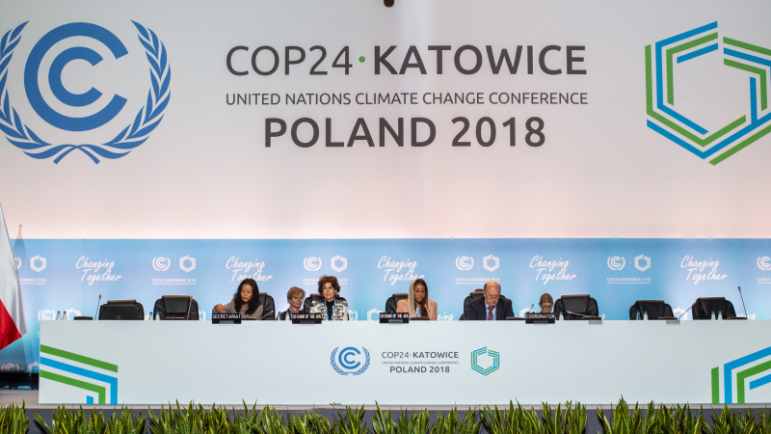
The United Nations’ annual climate talks aimed to accomplish three main goals: agreeing on a robust set of rules to implement the Paris Agreement; acknowledging the need for nations to raise the ambition of their emissions reductions commitments by 2020; and affirming climate finance commitments to allow less developed nations to deploy climate actions.
Finally, we can report that the world’s leaders adopted a common rulebook on how nations will formulate and report on their national emissions reductions pledges and move forward on adaptation, technology, and finance as well as other important provisions in the Paris Agreement. Although some rulebook elements need to be fleshed out, the December 15th agreement creates a solid foundation for implementation and strengthening of the historic accord created in Paris in 2015. It is important that the agreement reached in Poland could also help facilitate the re-entry of the United States into the Paris Agreement by a future presidential administration.
There was clear recognition at the climate summit that the world needs to get on a low-carbon pathway as soon as possible to meet the deep, near-term emissions cuts scientists conclude are needed by 2030. As noted earlier in this COP24 post, in November 2018 hundreds of the world’s leading climate scientists (the Intergovernmental Panel on Climate Change, or IPCC) confirmed in an exhaustive review of the scientific literature that climate change is under way now, impacts are going to get worse, and current climate action commitments are nowhere near what is needed to limit warming to 2.7 degrees F (1.5 degrees C) as countries agreed to in the Paris Agreement in 2015.
A clear majority of Americans support a rapid, equitable transition away from fossil fuels toward a clean, renewable energy future for all. That’s what’s needed to avoid the worst, most costly climate impacts. A majority of Americans also support regulation of carbon pollution by state and federal policy makers. President Trump continues to question the IPCC scientific report on the urgent need for climate action, and his administration is busy dismantling federal clean energy policies. In sharp contrast, I was inspired by the presence at the climate talks of U.S. state officials, businesses, cultural institutions, indigenous leaders, faith leaders, young activists, who together numbered in the thousands and represent the true face of America on climate change.
Given the climate change emergency, the outcome in Poland is barely adequate. A crucial next step for all nations comes in New York in September of next year. The United Nations Secretary-General, Antonio Guterres, is organizing the next climate summit. World leaders must come to those talks with clear commitments on more ambitious climate ambition by 2030. People around the world will be testing their leaders on commitments and achievements on climate pollution reduction, rather than on flowery statements of concern.
Every fraction of a degree F matters to kids growing up today. We citizens of every country must hold our leaders accountable to do their homework and complete strong climate action.
December 14 | International climate negotiations have entered overtime
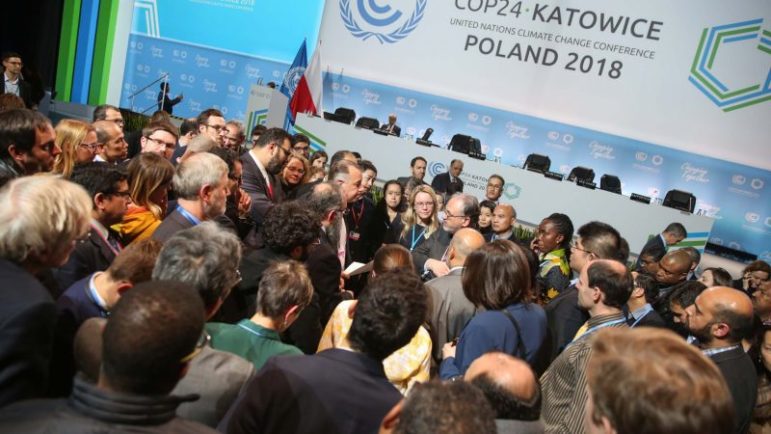
It’s late Friday evening in Katowice, Poland, with negotiators from over 190 nations still at the climate summit, working to reach agreement on language setting common rules for implementing the Paris Agreement and timelines and requirements for all nations to deepen their contributions to climate action.
I’ll share my final thoughts here on Monday morning. Over the weekend, you can get updates from me on Twitter or Facebook.
For a full color report of my work at the climate summit please make sure you register for Fresh Energy’s free webinar scheduled for Wednesday, December 19 from noon to 1:00 PM. My special guest on the webinar will be Patrick Hamilton of the Science Museum of Minnesota. Both Hamilton’s had great access to decision makers at the climate negotiations, and we are eager to tell you all about it!
Thank you all for your support and for reading these notes documenting Minnesota’s role in global climate action!
December 13 | Who’s holding back progress? The “colossal fossil” award goes to…

The Climate Action Network (CAN) is a worldwide network of over 1,300 non-governmental organizations in more than 120 countries working to promote government and individual action to limit human-induced climate change. Fresh Energy is one of over 175 American member organizations that make up the United States Climate Action Network (USCAN) “node.” (J. Drake Hamilton serves on the USCAN Board of Directors.) At the climate talks, CAN members work together closely to monitor negotiations and to urge worldwide action to be move forward with more ambition and on a faster pace to match the climate disaster.
Every day of the climate conference, CAN awards a “Fossil of the Day” to the country “that has done its best to be the worse in climate action negotiations and implementation.” Today’s Colossal Fossil of the Day was awarded in an evening ceremony and press conference to Poland, our host nation. Poland was selected for this negative attention because 1) it has not pushed for more ambition in the negotiations, 2) it promoted coal use at the global climate talks, and 3) it has been trying to silence nongovernmental organizations at the climate talks.
Agreements must be reached by the Parties to the Paris Agreement, as opposed to flowery “statements”: critical text must get into the official COP24 document
Fresh Energy arrived at the climate negotiations in Poland knowing the role of the ministers here is to develop common rules for implementing the Paris Agreement (also known as the Rulebook) and raise the ambition of all nations to reduce their greenhouse gas emissions. We need an official decision and official text from the Conference of Parties to the UNFCCC Paris Agreement that invites Parties to increase their national commitments to addressing climate change. This is the only way we will limit global warming to 1.5 degrees Celsius (2.7 degrees Fahrenheit). We have only 12 years left to take the deep actions necessary to ensure that we are on this course.
So far during the conference, Fiji and the Marshall Islands have already strengthened their national commitments, and we need many other nations to follow suit—as soon as feasibly possible. Notably, Australia has refused to take steps to dramatically ratchet up their carbon reductions. And a coalition of four nations—the United States, Kuwait, Russia, and Saudi Arabia—are refusing to even accept the IPCC scientific climate report.
This week at the negotiations, a much-welcomed, new High Ambition Coalition released a declaration officially announcing their fight for a decision during this COP on transnational ambition commitments. However, don’t be fooled by weak language! We need countries in the High Ambition Coalition to make strong statements in the negotiations shaping the COP decision outcome. That is, the language must be absolutely clear to ensure it holds nations accountable. There is no room for “feel good” statements in the media or in receptions. A clear commitment to ambition must be reflected strongly in the official text coming out of COP24. Countries currently involved in the new High Ambition Coalition presently include Argentina, Canada, Colombia, Costa Rica, Denmark, Ethiopia, the European Union Commission, Fiji, Finland, France, Germany, Grenada, Italy, Jamaica, Luxembourg, Macedonia, Marshall Islands, Mexico, Monaco, Netherlands, New Zealand, Norway, Portugal, Saint Lucius, Spain, Sweden, and the United Kingdom. Citizens of these nations need to press their negotiating ministers to shape the current negotiations so that they conclude with higher ambitions.
December 12 | Sharing the climate story

This morning, I spoke with Minnesota Public Radio’s climatologist Paul Huttner to send an update from the climate conference. In the interview, we discussed that regardless of the United States and the Trump administration’s official position at the climate talks and their attempts to downplay the grave dangers of climate change, independent analysis from America’s Pledge shows that with policies currently in place, the United States can meet at least two-thirds of its Paris Agreement targets. Every week, states—including Minnesota—are acting in lieu of federal leadership to build on actions that cut carbon deeply. No matter what the outcomes of the climate conference are, Minnesota and our country will have the opportunity to achieve America’s share of carbon reductions agreed upon in Paris, but it must take continued action and leadership at the sub-national level.
In Poland, the clock is winding down on the United Nations climate negotiations while discussions are ramping up. Wednesday is a crux day, as negotiators from 190 nations are working on a commitment about the rules that will govern the implementation of the Paris Climate Agreement. The rules must outline how nations must deepen their carbon reduction commitments in order to limit global warming to the scientifically critical 2.7 degrees Fahrenheit; the rule book needs to outline reporting requirements to ensure there is transparency, allowing countries to hold each other accountable to their climate commitments. The outcomes are still up in the air as the Friday deadline to the conference approaches. Stay tuned for more.
December 11 | The push is on
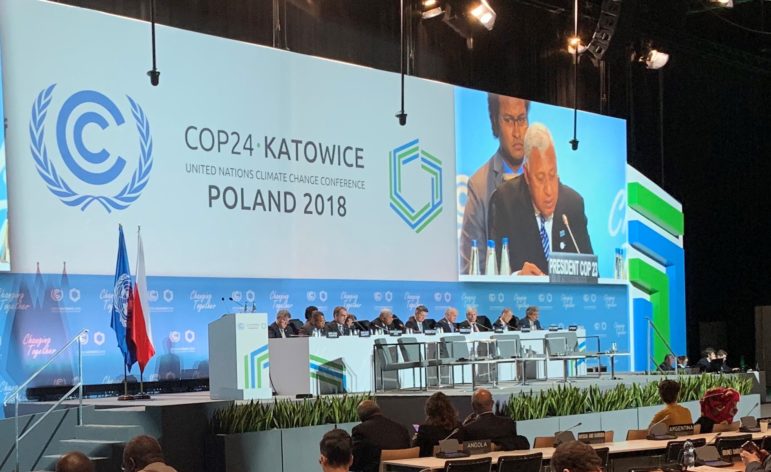
The push is on for the rule book to achieve ambitious 1.5 degrees C (2.7 degrees F) limit as per the Paris Agreement.
This second and final week of the United Nations climate change conference is the so-called “high level” week, when national ministers and heads of state arrive to negotiate the final language for new international climate actions. These technical, high level meetings are now taking place. Countries are discussing elements of the legal text for the rule book, including ensuring international transparency as to how well each nation is doing in achieving its climate goals. I expect to see a new draft of their text before tomorrow’s update.
What is at stake, as the scientists reminded us in the IPCC report, is that we have only 12 years in which to secure profound, rapid climate actions by all nations. The report stated clearly that a key component of action is that “coal needs to be exited from the power sector” including a reduction in coal emissions of 90 percent by the 2040s and the complete elimination of coal use in the power sector by the 2050s. The gap between what is needed and current emissions into the global atmosphere is huge.
The time for individual nations to declare wishes for the future has passed; what the negotiations need now is to deliver to the world a collective transnational agreement of how to do more—much more—on climate action. For the negotiations this year to be successful, these meetings must result in a decision on enhanced national “ambitions” for much greater climate action. These would include an agreement by each nation to increase its National Determined Contribution by the year 2020—actions originally submitted in advance of the historic Paris Agreement in 2015. We must limit global warming to no more than 1.5 degrees C and it is essential the rule book for doing so necessitates ambitious, transnational action.
Absent this text from the collective governments inviting countries to increase their climate commitments by 2020, we risk a global failure. In addition, the world at COP24 needs to ensure that financing is in place to secure support for implementing these national commitments in poorer nations.
At this point early in the week of the 5-day High Level Negotiations, there is a mood here in Poland of disillusionment with the negotiators. The Parties to the Paris Agreement seem to be aiming low. An egregiously bad example is the efforts by the United States, Saudi Arabia, Russia, and Kuwait, to downplay the IPCC report’s findings. These nations have failed to acknowledge the need to dramatically scale up climate mitigation and adaptation actions worldwide.
Fortunately, as we’ve reported frequently, the price is way down for renewable substitutes for fossil fuels in the power sector. Renewables are cheaper than coal in every country, but all countries need better policy to ensure that the transition away from coal proceeds much more rapidly.
The Polish presidency of COP24 is ultimately responsible for delivering from the assembled nations the official rule book. President of the COP Michal Kurtyka must work with the ministers from all parties to the Paris Agreement, to craft a planetary emergency package for adoption at the conference’s closing plenary session on Friday, December 14. The world’s citizens demand—and expect—nothing less.
December 10 | Side shows won’t fix the climate problem
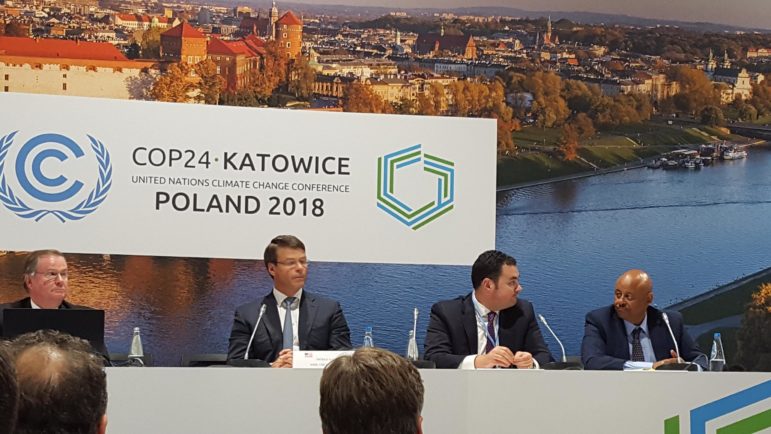
The United States’ only official event at the world’s climate conference was held today, a 75-minute panel at the two week-long conference. Its topic? Greater promotion of fossil fuel use. The panel will likely draw a lot of attention, but let’s be transparent—this is a side show. It is obvious that no event promoting increased greenhouse gas emissions has any place in 2018 at a global climate summit.
The United States staged a nearly identical side show at last year’s climate conference in Germany. The purpose was and is clear: to divert time and attention from the real climate leadership needed to address the existential crisis that is climate change. Make it known—we are here to build leadership solutions into the rule book for implementing the Paris Agreement and we will not be deterred.
Today’s less than one-hour event (the proceeding was brought to a stop for 15 minutes by protesters of all ages from many continents; thanks to those s/heroes!) was designed to enrage the majority of people who accept climate science, and to appease patrons of fossil fuels who have a direct financial incentive to weaken the Paris Climate Agreement. Evidence lies in the paucity of the speaker lineup: the most prominent voice was not even from the United States and not a member of the Trump Administration. That voice was Australia’s Ambassador for the Environment. That’s right: the Administration couldn’t even convene an all-American panel to fill five seats.
Here are the data: U.S. coal plant closures have doubled during Trump’s second year in office. U.S. coal use will likely reach a 39-year low in 2018. As Ben Fowke, the CEO of Xcel Energy, has been stating publicly to the company’s investors and customers for five (five!) years: “Coal is on its way out; it’s just a matter of time.” Wind energy and soon solar energy in Minnesota are much cheaper than just the fuel for Xcel’s least-expensive coal plant, and cheaper than natural gas.
Today’s side show is best ignored. As last year, we expect these tactics to have no impact on the crucial negotiations happening here in Poland and concluding late this week. State Department diplomats continue their work. Stay tuned for the remainder of this week for my insights into the real business of a global climate summit—designing the parameters and rules for implementing the Paris Agreement to limit the worldwide and local damages from unabated climate change.
December 9 | Weekend news
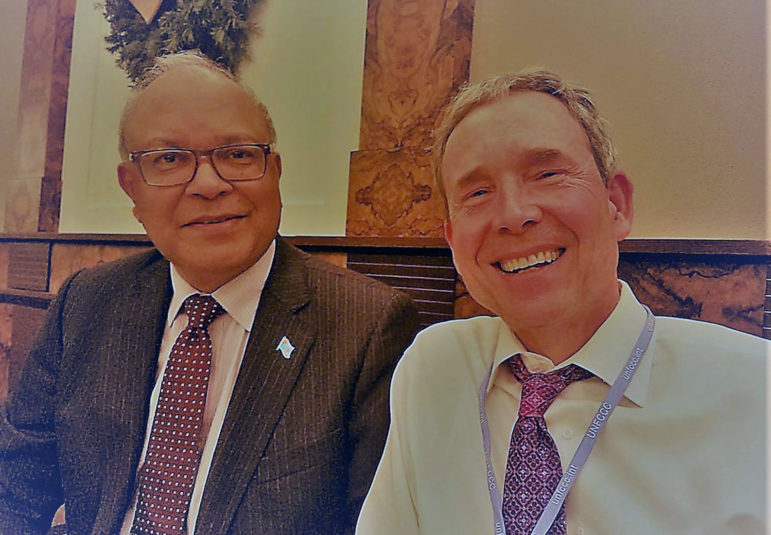
J. and Patrick Hamilton, who is representing the Science Museum of Minnesota, were honored to spend three hours meeting over the weekend with the Fiji Prime Minister and last year’s COP23 President, Frank Bainimarama, as well as negotiators from three other nations.
The Associated Press has been following United States representation at the event and our country’s commitment to bold climate action as part of the group We Are Still In. Learn more about next steps we can all take at our live discussion on December 19. We are looking forward to a robust week of negotiations when the conference resumes Monday. Stay tuned for more!
December 7 | Minnesota to COP24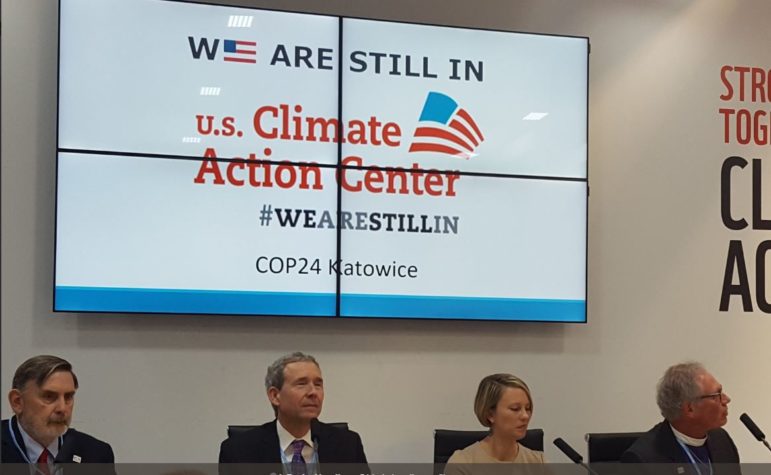
We are still in on the Paris Agreement, and Fresh Energy’s delegation makes the business case for policy action at the scale of the problem. Our official delegation to the U.N. Climate Conference held in Katowice, Poland this year, includes Patrick Hamilton, who is director of global change initiatives at the Science Museum of Minnesota. We are proud that Patrick, also representing Minnesota, spoke at the global event this morning to kick off the work in Poland of the U.S. Climate Action Center.
Hamilton (who also happens to be Fresh Energy’s J. Drake Hamilton’s husband—talk about a “power” couple!) shared great Minnesota stories of ingenuity and success. He spoke of Xcel Energy’s work ten years ago with the Science Museum, when the utility introduced them to technology that could greatly reduce carbon emissions by reusing “waste” heat, in work pioneered by a Minnesota mechanical engineer. Using heat recovery engines manufactured by Trane in Lacrosse, Wisconsin, the Science Museum so far has cut heating load more than 65 percent and took this action because it made good business sense.
Patrick Hamilton also delivered the breaking news this week from Minnesota-based Xcel Energy. Xcel’s CEO announced that the company has become the first U.S. utility to set a goal to provide all its customers with 85 percent carbon-free electricity by 2035, and 100 percent carbon-free electricity by 2050. That decarbonization commitment is based on the urgent recommendations of climate scientists serving on the Intergovernmental Panel on Climate Change. Since Xcel Energy provides electricity in eight states between the Canadian border and Mexico, setting a goal to eliminate greenhouse gas emissions with have a huge positive impact on reducing the impacts of global warming.
The panel also included representatives from We Are Still In, with over 3,600 members in all 50 states and representing over $9.46 trillion of the U.S. GDP. Members include the state of Minnesota, the cities of Eden Prairie, Duluth, Saint Paul, and Minneapolis, companies headquartered in Minnesota including Target and Aveda, Minnesota cultural organizations including the Science Museum of Minnesota, the American Swedish Institute, and the Great Lakes Aquarium in Duluth, and health organizations including HealthPartners.
Drake Hamilton met this week with Polish citizens looking for hope and concrete ideas for carbon reduction. J. thinks it is critical that this year’s climate summit is deliberately being held in a coal-mining region of Poland. The Polish electricity system is presently 80 percent coal, and the Poles are extremely eager to make meaningful progress toward replacing that coal with renewable energy. Patrick Hamilton told the standing-room only crowd today: Minnesota as recently as the early 2000s was in as deep a hole as Poland in terms of coal for electricity; less than a generation ago, Minnesota’s power supply was 75 percent coal, and some utilities were 95 percent coal. Today, thanks to our successful renewable energy policy, Minnesota’s electricity generation is less than 39 percent coal, and decarbonization is continuing. What we’ve accomplished already in Minnesota is also possible in Poland.
The global audience warmly applauded both Minnesota’s progress on replacing coal with renewable energy and energy efficiency, and separately applauded Xcel Energy for setting a high decarbonization goal and for announcing its intention to model the pathway for all other U.S. utilities to follow. Fresh Energy’s delegate to the climate summit, thus explained to the world how Minnesota is proving the business case for deep carbon reduction action. As Governor-elect Tim Walz said during his campaign, during an interview on TPT’s Almanac show: “Climate change is an existential threat. If Washington won’t lead on it, Minnesota will. Minnesota’s future is in the green economy.”
November 30 | COP24 webinar: what can we expect?
Watch the recording of our pre-event webinar What do we need from the global climate summit? where J. reports on what to expect, how you can help, and what the world needs to accomplish at these critical meetings.
September 20 | Minnesota on the international stage
This December, Fresh Energy’s science policy director, J. Drake Hamilton, will travel to Katowice, Poland, to participate in the United Nations 24th Conference of the Parties to the United Nations Framework Convention on Climate Change (COP24). The conference is part of the ongoing United Nations negotiations that created the 2015 Paris Climate Agreement—the unprecedented international commitment to reducing global greenhouse gas emissions.
Although the U.S.—the world’s second largest emitter—has declared its intention to remove itself as a signatory, Fresh Energy will participate with other American businesses and civic leaders who are leading the American climate movement, working collectively as We Are Still In. This group, made up of American businesses, states, cities, nonprofit organizations, cultural institutions, universities, and more, have all made a firm commitment to reducing emissions. Fresh Energy will be showcasing to the world Minnesota’s leadership on carbon pollution cuts, which have been achieved through smart policy and leadership among businesses. Hamilton brings a depth of knowledge of to these summits, as a participant who has met with the official U.S. negotiators over the span of twelve years. She also recently traveled to Greece to deliver the keynote address at an international meeting focused on climate justice.
If you are interested in receiving updates about what will be happening at this global summit, please fill out the form below. J. will be sharing short daily written updates during her time there. Make sure to also sign up for our post-event reflection webinar on the results of the negotiations on December 19 from 12:00 – 1:00 PM.
Follow J. on Twitter and Fresh Energy on Facebook for all the latest news.
